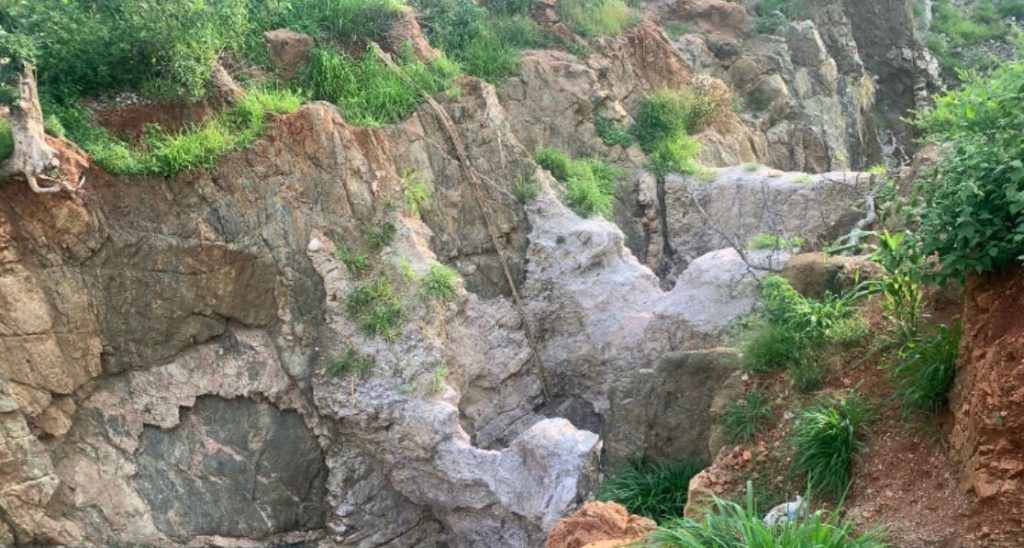Kakafu, a once peaceful village in Kwara State, transformed dramatically in 2021 after the discovery of lithium, a key material for electric car and smartphone batteries. The Nupe locals, who once thrived on farming wheat and other crops, shifted to mining as Chinese businessmen and illegal miners flooded the village.
Smooth, narrow farm roads widened and deteriorated under the weight of trucks, motorbikes, and excavators, while many abandoned agriculture for more lucrative mining work. A tonne of lithium, depending on its purity, could fetch up to ₦200,000 ($127), offering a significant financial incentive.
Ibrahim Mohammed and his brother arrived in Kakafu in 2022 during the mining boom. Mohammed transitioned from a miner to a coordinator, connecting buyers with miners. According to him, mining is straightforward: individuals can buy land from owners, employ local workers, or bring excavators to start digging. Buyers simply pay a waybill—a community levy to the Lade District Development Association—and transport the material without disruptions. However, it remains unclear whether any of these funds reach the federal government.

From Kakafu, trucks transport the lithium 215 kilometres to Ilorin, Kwara State’s capital, before it reaches assembly points in Ogun and Lagos States for export. The Economic and Financial Crimes Commission (EFCC) reported in February that it had seized truckloads of illegally mined minerals, including lithium, destined for foreign markets without taxes or royalties. This enforcement aligns with President Bola Tinubu’s crackdown on illegal mining, which he claims fuels weapon purchases and escalates conflicts in Nigeria’s north-west. Despite government interventions, community leaders argue illegal mining results from poverty and poor public service delivery. A parliamentary report estimates Nigeria loses $9 billion annually to unregulated mining activities.
The government is keen on leveraging the untapped mineral sector to reduce its dependence on oil and gas. Nigeria’s Minister of Solid Minerals Development, Dele Alake, estimated that the sector could be worth $750 billion, nearly twice Nigeria’s current GDP. However, mining currently contributes less than 1% of GDP, as reported by the Extractive Industries Transparency Initiative (EITI). In 2021, Nigeria exported 142.5 million tonnes of solid minerals valued at ₦167.87 billion ($101.3 million), yet only ₦3.57 billion ($2.15 million) in royalties was paid. Between 2017 and 2021, the government earned just ₦12.8 billion ($7.72 million) in royalties, with 914 of 1,214 mining companies fulfilling their obligations.
Nigeria, Africa’s top oil producer, heavily relies on the oil and gas sector for 65% of government revenue and 85% of total exports. However, volatile global oil prices have triggered multiple economic recessions. In 2021, Nigeria’s oil output was 1.8 million barrels per day, projected to hit 2 million barrels by 2024. Despite this, the government recognises the need to diversify revenues.
Analysts blame Nigeria’s failure to maximise its solid mineral resources on a lack of investment and infrastructure. Maxwell Kuu-ire, a policy analyst at Global Financial Integrity, noted that the government has not provided accurate geodata to attract investors. Without comprehensive geological surveys, potential investors hesitate to commit capital to mining projects. Kuu-ire also stressed that critical infrastructure like roads and railways must improve to make the sector viable. Of Nigeria’s 200,000 km of roads, only 60,000 km are paved, with just 11,000 km in good condition. Most of the railway infrastructure, except for the recently upgraded Lagos-Ibadan and Abuja-Kaduna lines, remains outdated and inefficient.
Paul Alaje, chief economist at SPM Professionals, identified a lack of transparency as a major issue. He urged the government to create a comprehensive database of miners and their financial inflows. Tracking every mineral export and revenue generated would ensure better accountability.
To address these challenges, the government plans to establish the Nigerian Solid Minerals Corporation, which will operate under a private-sector-inspired structure. The federal government will retain 25% ownership, Nigerian citizens will hold another 25% through public shares, and private investors will control the remaining shares, with a cap of 10% each. Minister Alake also cracked down on dormant mining licenses, revoking 924 titles after withdrawing 1,600 earlier for non-payment of statutory fees.
Additionally, the government reviewed mining license fees and introduced the mining marshal command within the Nigeria Security and Civil Defence Corps to secure mining sites and improve investor confidence. While the marshal unit remains in its infancy, government officials are optimistic about its eventual impact.
Despite ongoing reforms, Nigeria’s mineral sector lags far behind competitors like South Africa, which generated $51.6 billion from mining in 2022. To catch up, Nigeria must prioritise infrastructure, attract investments, and enforce accountability.

